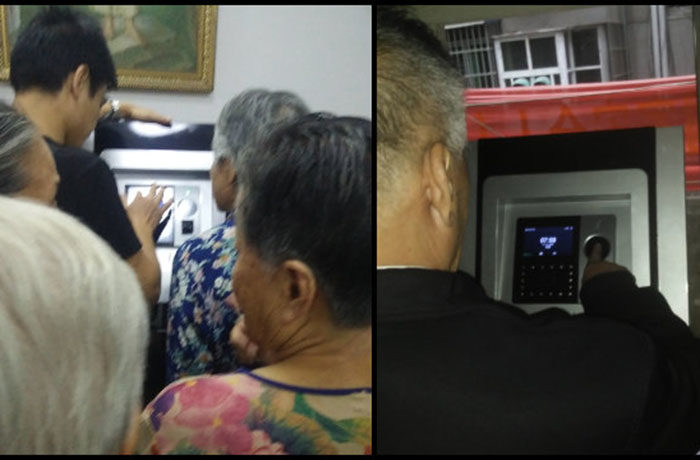
Elderly believers are queuing to have their fingerprints taken at a church in China. Photo| Bitter Winter
A magazine on religious liberty and human rights in China reports that Hi-tech surveillance devices including face and fingerprint scanning equipment are now being installed in churches throughout the populous nation in East Asia.
Bitter Winter says the biometric devices were first placed in a government-controlled church, called the Three-Self Church, in Urumqi — the capital of the Xinjiang Uyghur Autonomous Region — and is now being introduced elsewhere in China.
“Congregation members have to stand in line to have their faces and fingerprints scanned before being allowed to enter the church,” the news source said, listing Muyang Church, Tian’en Church among places where the devices have been spotted.
In a similar report, The Christian post observed a churchgoer disturbed by the order since “it requires not only that members be under constant tracking and surveillance, but that their families and relatives are implicated by association.”
Bitter Winter reported that this initiative comes as a threat to civil servants or Communist Party members who “may have restrictions imposed on their activities; this can even negatively impact their promotion at work.”
A congregation member told the Magazine he believes that this is how the government is imposing further control over Three-Self believers all over the country.
State surveillance of churches is not new in China, according to the Christian post. A project labelled Sharp Eyes has long had a presence in state-run churches, with cameras placed even in washrooms of certain places of worship to ensure “comprehensive monitoring.”
The surveillance program intends to cover all rural areas with the goal of achieving “blind-spot-free monitoring” by the year 2020, “covering all regions, sharing across all networks, available at all times, and controlled at all points.”
In January 2019, theguardian reported that one of the goals of Chinese government is to develop a work plan for “promoting Chinese Christianity” between 2018 and 2022 “thought reform”.
The plan includes “retranslating and annotating” the Bible, to find commonalities with socialism and establish a “correct understanding” of the text.
Earlier this year still, reports emerged that state-run churches in Qingdao city in the eastern province of Shandong were ordered to stop singing songs from the Worship Songs or Spiritual Song Collection and were instead ordered to sing from a book of hymns approved by the state.
The new approved songs only featured themes about loving the nation of China, celebrating birthdays and funerals, and respecting parents and the elderly.
Uganda Christian News reported in April that Bibles were pulled from sale through online bookstores across China.

